- Home
- Evelyn Waugh
Officers and Gentlemen Page 2
Officers and Gentlemen Read online
Page 2
The Adjutant observed Guy’s roving, lamenting eyes.
‘Pretty bloody, isn’t it? Everything has been stored away underground since the blitz.’ Then from the bleakest spot in the universal desolation: ‘I’ve lost a pip, too.’
‘So I saw. Bad luck.’
‘I expected it,’ said the Adjutant. ‘I wasn’t due for promotion for another two years in the regular way. I thought the war might hurry things along a bit. It has for most chaps. It did for me for a month or two. But it didn’t last.’
There was no fire.
‘It’s cold in here,’ said Guy.
‘Yes. No fires until evening. No drinks either.’
‘I suppose it’s the same everywhere?’
‘No, it’s not,’ said the Adjutant crossly. ‘Other regiments still manage to live quite decently. The Captain-Commandant is a changed character. Austerity is the order now. Trust the Corps to do it in a big way. We’re sleeping four in a room and the mess subscription has been halved. We practically live on rations – like wild beasts,’ he specified woefully but inaptly. ‘I wouldn’t stay here long if I were you. By the way, why are you here?’
‘I came home with the Brigadier.’ That seemed at the moment the most convenient explanation. ‘You know he’s back, of course?’
‘First I’ve heard of it.’
‘You know he got wounded?’
‘No. Nothing ever seems to come to us here. Perhaps they’ve lost our address. The Corps got on very nicely the size it was. All this expansion has been the devil. They’ve taken my servant away – a man I’d had eight years. I have to share an old sweat with the Regimental Surgeon. That’s what we’ve come to. They’ve even taken the band.’
‘It’s too cold to sit here,’ said Guy.
‘There’s a stove in my office but the telephone keeps ringing. Take your choice.’
‘What am I to do now?’
‘My dear chap, as far as I’m concerned you’re still in Africa. I’d send you on leave but you aren’t on our strength. D’you want to see the Captain-Commandant? That could be arranged.’
‘A changed character?’
‘Horribly.’
‘I don’t see any reason to bother him.’
‘No.’
‘Well, then?’
They gazed hopelessly at one another across the empty grate.
‘You must have had a move order.’
‘No. I was just packed off like a parcel. The Brigadier left me at the aerodrome saying I’d be hearing from him.’
The Adjutant had exhausted all his meagre official repertoire.
‘It couldn’t have happened in peacetime,’ he said.
‘That is certainly true.’
Guy observed that this unknown soldier was collecting all his resolution for a desperate decision; at length: ‘All right, I’ll take a chance on it. You can use some leave, I suppose?’
‘I promised to do something for Apthorpe – you remember him at Penkirk?’
‘Yes, I do. Very well.’ Exhilarated to find at last a firm mental foothold: ‘Apthorpe. Temporary officer who somehow got made second-in-command of the Battalion. I thought him a bit mad.’
‘He’s dead now. I promised I’d collect his possessions and hand them over to his heir. I could do that in the next few days.’
‘Excellent. If there’s any bloodiness, that catches them two ways. We can call it compassionate or disembarkation leave, just as the cat jumps. Staying to lunch in the mess? I shouldn’t.’
‘I won’t,’ said Guy.
‘If you hang about, there may be some transport going to the station. Two months ago I could have laid it on. That’s all been stopped.’
‘I’ll get a taxi.’
‘You know where to find the telephone? Don’t forget to leave twopence in the box. I think I’ll get back to my office. As you say, it’s too cold here.’
Guy lingered. He entered the mess under the gallery which had lately resounded with ‘The Roast Beef of Old England’. The portraits were gone from the walls, the silver from the side tables. There was little now to distinguish it from the dining-hall of Kut-al-Imara House. An AT came in from the serving door whistling; she saw Guy and continued to whistle as she rubbed a cloth over the bare boards of a table.
There was a click of balls from the billiard-room. Guy looked in and saw chiefly a large khaki behind. The player struck and widely missed an easy cannon. He stood up and turned.
‘Wait for the shot,’ he said with a stern but paternal air which purged the rebuke of all offence.
He was in his shirt-sleeves, revealing braces striped with the Halberdier colours. A red-tabbed tunic hung on the wall. Guy recognized him as an elderly colonel who had pottered about the mess a year ago. ‘Care for a hundred up?’ and’ Not much news in the papers today,’ had been his constant refrain.
‘I’m very sorry, sir,’ said Guy.
‘Puts a fellow off, you see,’ said the Colonel. ‘Care for a hundred up?’
‘I’m afraid I am just going.’
‘Everyone here is always going,’ said the Colonel.
He padded round to his ball and studied the position. It seemed hopeless to Guy.
The Colonel struck with great force. All three balls sped and clicked and rebounded and clicked until finally the red trickled slower and slower towards a corner, seemed to come to a dead stop at the edge of the pocket, mysteriously regained momentum and fell in.
‘Frankly,’ said the Colonel, ‘that was something of a fluke.’
Guy slipped away and gently closed the door. Glancing back through the glazed aperture he observed the next stroke. The Colonel put the red on its spot, studied the uncongenial arrangement and then with plump finger and thumb nonchalantly moved his ball three inches to the left. Guy left him to his solitary delinquency. What used the regulars to call him? Ox? Tiny? Hippo? The nickname escaped him.
With sterner thoughts he turned to the telephone and called for his taxi.
So Guy set out on the second stage of his pilgrimage, which had begun at the tomb of Sir Roger. Now, as then, an act of pietas was required of him; a spirit was to be placated. Apthorpe’s gear must be retrieved and delivered before Guy was free to follow his fortunes in the King’s service. His road lay backward for the next few days, to Southsand and Cornwall. ‘Chatty’ Corner, man of the trees, must be found, somewhere in the trackless forests of wartime England.
He paused in the ante-room and turned back the pages of the Visitors’ Book to the record of that Guest Night last December. There, immediately below Tony Box-Bender’s name, he found ‘James Pendennis Corner’. But the column where his address or regiment should have stood, lay empty.
3
THE last hour of the day at Our Lady of Victory’s Preparatory School, temporarily accommodated at Matchet. Selections from Livy in Mr Crouchback’s form-room. Black-out curtains drawn. Gas fire hissing. The customary smell of chalk and ink. The Fifth Form drowsy from the football field, hungry for high tea. Twenty minutes to go and the construe approaching unprepared passages.
‘Please, sir, it is true, isn’t it, that the Blessed Gervase Crouchback was an ancestor of yours?’
‘Hardly an ancestor, Greswold. He was a priest. His brother, from whom I am descended, didn’t behave quite so bravely, I’m sorry to say.’
‘He didn’t conform, sir?’
‘No, but he kept very quiet – he and his son after him.’
‘Do tell us how the Blessed Gervase was caught, sir.’
‘I’m sure I’ve told you before.’
‘A lot of us were absent that day, sir, and I’ve never quite understood what happened. The steward gave him away, didn’t he?’
‘Certainly not. Challoner misread a transcript from the St Omers records and the mistake has been copied from book to book. All our own people were true. It was a spy from Exeter who came to Broome asking for shelter, pretending to be a Catholic.’
The Fifth Form sat back contentedly. O
ld Crouchers was off. No more Livy.
‘Father Gervase was lodged in the North turret of the forecourt. You have to know Broome to understand how it happened. There is only the forecourt, you see, between the house and the main road. Every good house stands on a road or a river or a rock. Always remember that. Only hunting-lodges belong in a park. It was after the Reformation that the new rich men began hiding away from the people….’
It was not difficult to get old Crouchers talking. Greswold major, whose grandfather he had known, was adept at it. Twenty minutes passed.
‘… When he was examined by the Council the second time he was so weak that they gave him a stool to sit on.’
‘Please, sir, that’s the bell.’
‘Time? Oh, dear, I’m afraid I’ve let myself run on, wasting your time. You ought to stop me, Greswold. Well, we’ll start tomorrow where we left off. I shall expect a long, thorough construe.’
‘Thank you, sir; good night. It was jolly interesting about the Blessed Gervase.’
‘Good night, sir.’
The boys clattered away. Mr Crouchback buttoned his greatcoat, slung his gas-mask across his shoulder and, torch in hand, walked downhill towards the lightless sea.
The Marine Hotel which had been Mr Crouchback’s home for nine years was as full now as though in the height of summer. Every chair in the Residents’ Lounge was held prescriptively. Novels and knitting were left to mark the squatters’ rights when they ventured out into the mist.
Mr Crouchback made straight for his own rooms, but, encountering Miss Vavasour at the turn of the stairs, he paused, pressing himself into the corner to let her pass.
‘Good evening, Miss Vavasour.’
‘Oh, Mr Crouchback, I have been waiting for you. May I speak to you for a moment?’
‘Of course, Miss Vavasour.’
‘It’s about something that happened today.’ She spoke in a whisper. ‘I don’t want Mr Cuthbert to overhear me.’
‘How very mysterious! I’m sure I have no secrets from the Cuthberts.’
‘They have from you. There is a plot, Mr Crouchback, which you should know about.’
Miss Vavasour had turned about and was now making for Mr Crouchback’s sitting-room. He opened the door and stood back to admit her. A strong smell of dog met their nostrils.
‘Such a nice manly smell,’ said Miss Vavasour.
Felix, his golden retriever, rose to meet Mr Crouchback, stood on his hind legs and pawed Mr Crouchback’s chest.
‘Down, Felix, down, boy. I hope he’s been out.’
‘Mrs Tickeridge and Jenifer took him for a long walk this afternoon.’
‘Charming people. Do sit down while I get rid of this absurd gasbag.’
Mr Crouchback went into his bedroom, hung up his coat and haversack, peered at his old face in the looking-glass and returned to Miss Vavasour.
‘Well, what is this sinister plot?’
‘They want to turn you out,’ said Miss Vavasour.
Mr Crouchback looked round the shabby little room, full of his furniture and books and photographs. ‘I don’t think that’s possible,’ he said; ‘the Cuthberts would never do a thing like that – after all these years. You must have misunderstood them. Anyway, they can’t.’
‘They can, Mr Crouchback. It’s one of these new laws. There was an officer here today – at least he was dressed as an officer – a dreadful sort of person. He was counting all the rooms and looking at the register. He talked of taking over the whole place. Mr Cuthbert explained that several of us were permanent residents and that the others had come from bombed areas and were the wives of men at the front. Then the so-called officer said: “Who’s this man occupying two rooms?” and do you know what Mr Cuthbert said? He said, “He works in the town. He’s a school-teacher.” You, Mr Crouchback, to be described like that!’
‘Well, it’s what I am, I suppose.’
‘I very nearly interrupted them then and there, to tell them who you are, but of course I wasn’t really part of the conversation. In fact I don’t think they realized I was within hearing. But I boiled. Then this officer asked: “Secondary or Primary?” and Mr Cuthbert said: “Private” and then the officer laughed and said: “Priority nil.” And after that I simply could not restrain myself any more so I simply got up and looked at them and left the room without a word.’
‘I’m sure you did much the wisest thing.’
‘But the impertinence of it!’
‘I’m sure nothing will come of it. There are all sorts of people all over the place nowadays making inquiries. I suppose it’s necessary. Depend upon it, it was just routine. The Cuthberts would never do a thing like that. Never. After all these years.’
‘You are too trustful, Mr Crouchback. You treat everyone as if he were a gentleman. That officer definitely was not.’’
‘It was very kind of you to warn me, Miss Vavasour.’
‘It makes me boil,’ she said.
When Miss Vavasour had gone Mr Crouchback took off his boots and socks, his collar and his shirt and standing before the wash-hand-stand in trousers and vest washed thoroughly in cold water. He donned a clean shirt, collar and socks, shabby pumps and a slightly shabby suit made of the same cloth as he had worn throughout the day. He brushed his hair. And all the time he thought of other things than Miss Vavasour’s disclosure. She had cherished a chivalrous devotion for him since she first settled at Matchet. His daughter Angela joked of it rather indelicately. For the six years of their acquaintance he had paid little heed to anything Miss Vavasour said. Now he dismissed the Cuthbert plot and considered two problems that had come to him with the morning’s post. He was a man of regular habit and settled opinion. Doubt was a stranger to him. That morning, in the hour between Mass and school, he had been confronted with two intrusions from an unfamiliar world.
The more prominent was the parcel; bulky and ragged from the investigations of numberless clumsy departmental hands. It was covered with American stamps, customs declarations, and certificates of censorship.
‘American parcel’ was just beginning to find a place in the English vocabulary. This was plainly one of these novelties. His three Box-Bender granddaughters had been sent to a place of refuge in New England. Doubtless it came from them. ‘How kind. How very extravagant,’ he had thought and had borne it to his room for later study.
Now he cut the string with his nail scissors and spread the contents in order on his table.
First came six tins of ‘Pullitzer’s Soup’. They were variously, lusciously named but soup was one of the few articles of diet in which the Marine Hotel abounded. Moreover, he had an ancient conviction that all tinned foods were made of something nasty. ‘Silly girls. Well, I daresay we shall be glad of it one day.’ Next there was a transparent packet of prunes. Next a very heavy little tin labelled ‘Brisko. A Must in every home.’ There was no indication of its function. Soap? Concentrated fuel? Rat poison? Boot polish? He would have to consult Mrs Tickeridge. Next a very light larger tin named ‘Yumcrunch’. This must be edible for it bore the portrait of an obese and badly brought-up little girl waving a spoon and fairly bawling for the stuff. Last and oddest of all a bottle filled with what seemed to be damp artificial pearls, labelled ‘Cocktail Onions’. Could it be that this remote and resourceful people who had so generously (and, he thought, so unnecessarily) sheltered his grandchildren; this people whose chief concern seemed to be the frustration of the processes of nature – could they have contrived an alcoholic onion?
Mr Crouchback’s elation palled; he studied his gift rather fretfully. Where in all this exotic banquet was there anything for Felix? The choice seemed to lie between Brisko and Yumcrunch.
He shook Yumcrunch. It rattled. Broken biscuits? Felix stood and pointed his soft muzzle.
‘Yumcrunch?’ said Mr Crouchback seductively. Felix’s tail thumped the carpet.
And then suspicion darkened Mr Crouchback’s contentment: suppose this were one of those new patent foods he had he
ard described, something ‘dehydrated’ which, eaten without due preparation, swelled enormously and fatally in the stomach.
‘No, Felix,’ he said. ‘No Yumcrunch. Not until I have asked Mrs Tickeridge,’ and at the same time he resolved to consult that lady about his other problem: the matter of Tony Box-Bender’s odd postcard and Angela Box-Bender’s odd letter.
The postcard had been enclosed in the letter. He had taken both to school with him and reread them often during the day. The letter read:
Lower Chipping Manor,
Nr Tetbury
Dearest Papa,
News at last from Tony. Nothing very personal poor boy but such a joy to know he is safe. Until this morning I didn’t realize how anxious I have been. After all the man who got away and wrote to us that he had seen Tony in the POW column might have been mistaken. Now we know.
He seems to think we can send him anything he needs but Arthur has been into it and says no, that isn’t the arrangement. Arthur says he can’t approach neutral embassies and I mustn’t write to America either. Only regular Red Cross parcels may be sent and they get those anyhow apparently whether we pay for them or not. Arthur says the parcels are scientifically chosen so as to have all the right calories and that there can’t be one law for the rich and one for the poor when it comes to prison. I see he’s quite right in a way.
The girls seem to be enjoying America tremendously.
How is Dotheboys Hall?
Love,
Angela.
Tony’s card read:
Was not allowed to write before. Now in permanent camp. A lot of our chaps here. Can daddy arrange parcels through neutral embassies? This is most important and everyone says safest and quickest way. Please send cigarettes, chocolates, golden syrup, cocoa, tinned meat and fish (all kinds). Glucose ‘D’. Hard biscuits (ships) cheese, toffee, condensed milk, camel hair sleeping bag, air-cushion, gloves, hair brush. Could girls in US help? Also Boulestin’s Conduct of Kitchen. Trumper’s Eucris. Woolly slippers.

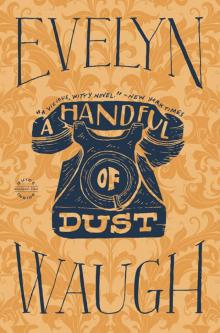 A Handful of Dust
A Handful of Dust Complete Stories of Eveyln
Complete Stories of Eveyln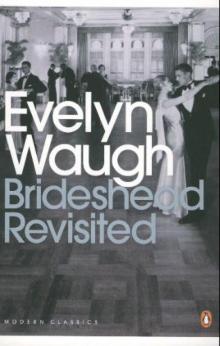 Brideshead Revisited
Brideshead Revisited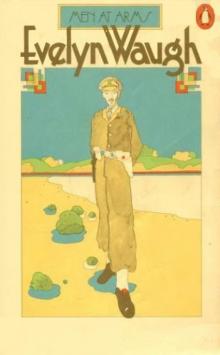 Men at Arms
Men at Arms Black Mischief
Black Mischief When the Going Was Good
When the Going Was Good Officers and Gentlemen
Officers and Gentlemen Helena
Helena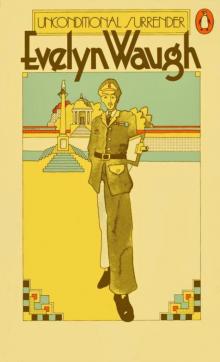 Unconditional Surrender
Unconditional Surrender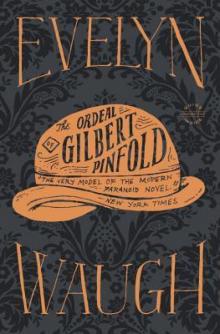 The Ordeal of Gilbert Pinfold
The Ordeal of Gilbert Pinfold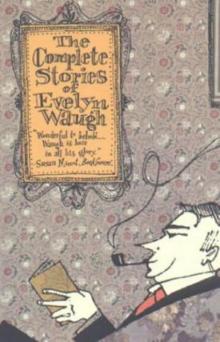 The Complete Stories Of Evelyn Waugh
The Complete Stories Of Evelyn Waugh